Unleash Your Hidden Talents to Transform the World: Michael Hyacinthe & Katharine Hayhoe
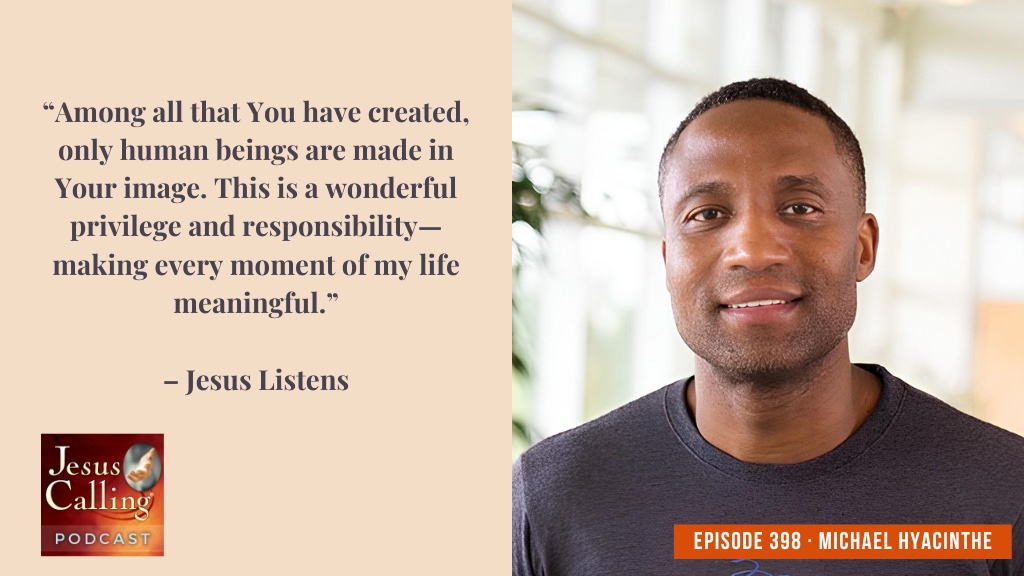
Michael Hyacinthe: It pays to stay the course and stick out the journey because what you perceive as the future may not actually be the future, but the only way to know is to just continue towards that path, and have faith.
Unleash Your Hidden Talents to Transform the World: Michael Hyacinthe & Katharine Hayhoe – Episode #398
Narrator: Welcome to the Jesus Calling Podcast. This week, we speak with Navy veteran Michael Hyacinthe, who is also an artist and sculptor. Michael recounts the profound impact of his time in the military, and how, after he returned to civilian life, he wanted to use his talent in the arts to support veterans, and eventually children through his company Wimage, who created a toy robot named Wimee, featured on the PBS children’s show called Wimee’s Words. Our second guest is climate scientist and speaker Katharine Hayhoe, whose work bridges the gap between science and faith. Interpreting complex climate data through the lens of religious stewardship, Katharine educates faith-based communities on their role as protectors of creation. Both individuals exemplify how unconventional talents can spark change and encourage others to utilize their own unique gifts for the greater good.
Let’s begin with Michael’s story.
Michael: My name is Michael Hyacinthe. I am a U.S. Navy Seabee veteran and a social entrepreneur, and the founder of Has Heart and the founder of Wimage, a children’s media and technology company.
Work Hard, Dream Big, and Have Faith
Growing up, I was always a big dreamer. My parents are from Haiti and I actually was born in Haiti, and my parents left my twin and I to live with my grandmother for our first five years. And then she and my dad left Haiti to go to New York to work and build a better life for my twin and I.
I remember just seeing the lights at JFK airport. In Haiti, you don’t get access to too much light because of the poverty in Haiti. So my first time at JFK, I just remember seeing so many lights and being so thrilled and excited to be experiencing the light that the airport provided.
We first moved to Queens, New York, where my dad drove a New York City yellow cab. And my mom worked as a nurse’s aid, just trying to create opportunities so that our family can live a better life. They showed us the opportunities if you work hard and you focus and have faith, anything is possible.
So even then, I was always a dreamer trying to understand who I am and why I’m here and trying to figure out how to truly acknowledge the blessing of being in New York City, in America. I wanted to do good and give back, and be a part of the community. I eventually joined the military.
A Military Career Inspires a Heart for Veterans
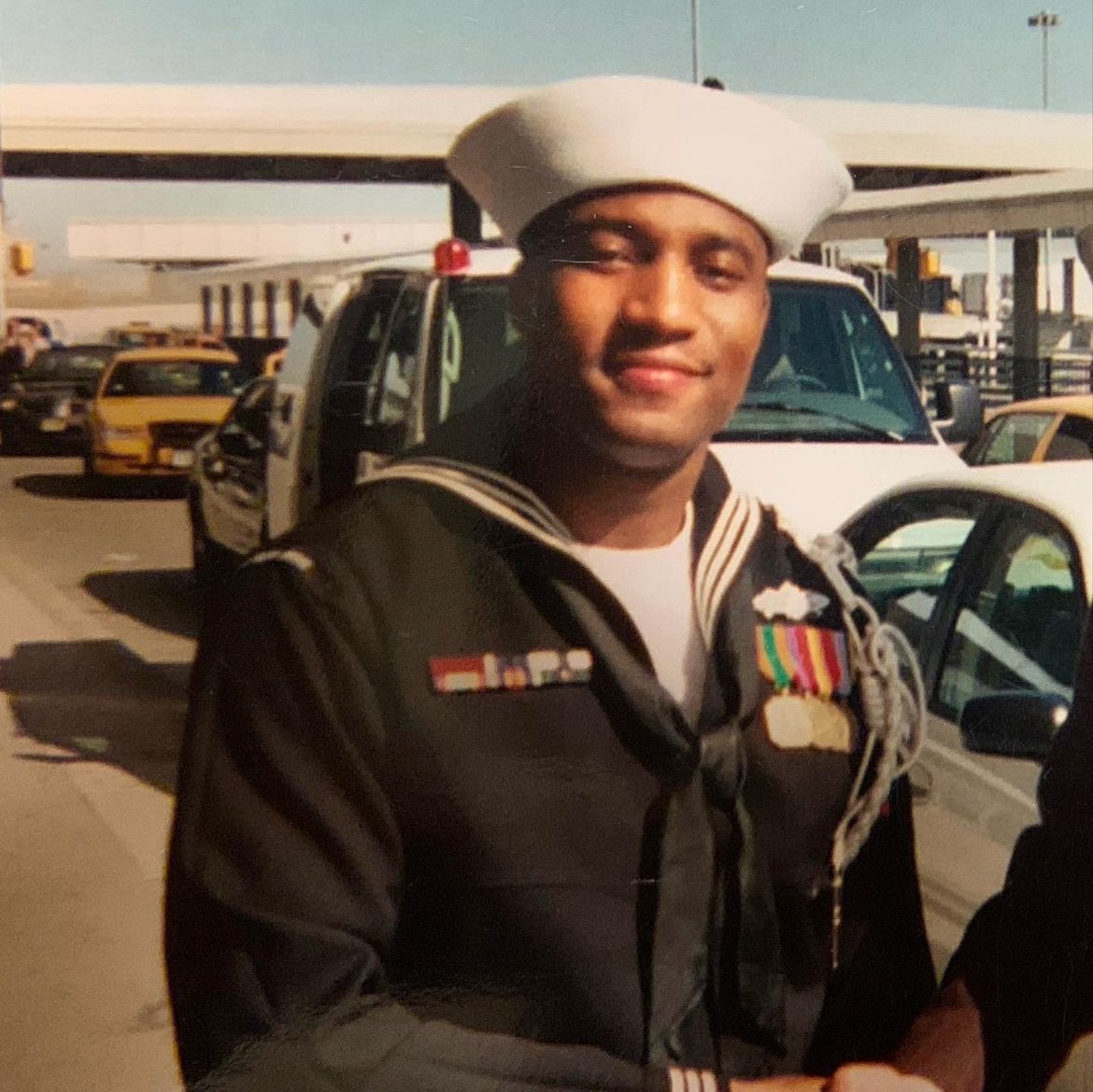
Right out of high school at seventeen years old, I enlisted to become a U.S. Navy Seabee. Seabees are the engineers of the military, specifically for the Navy. We’re the ones that travel around, those particular places to create the infrastructure so that the military branches can come and have a place to live and do the work that they are meant to do.
I was stationed in Iceland for a year and a half, and from there I went to NMCB 40 [Navy Mobile Construction Battalion 40] out of a port in California. I deployed to the Middle East, to Guam, with the Fighting 40 Battalion, and that’s where I got my Seabee Combat Warfare pin and continued to do humanitarian missions around the world with some really, really good guys. Once I finished my deployments with NMCB 40, I went back to New York.
I was still a reservist. During 9/11, I was recalled back into active duty with my reserve unit. And while some of the guys ended up deploying to combat, because of my rank, I was asked to participate in what’s called the Casualty Assistance unit. And so my job was to go in and notify the next of kin for those who were killed in combat and that was a really, really tough time.
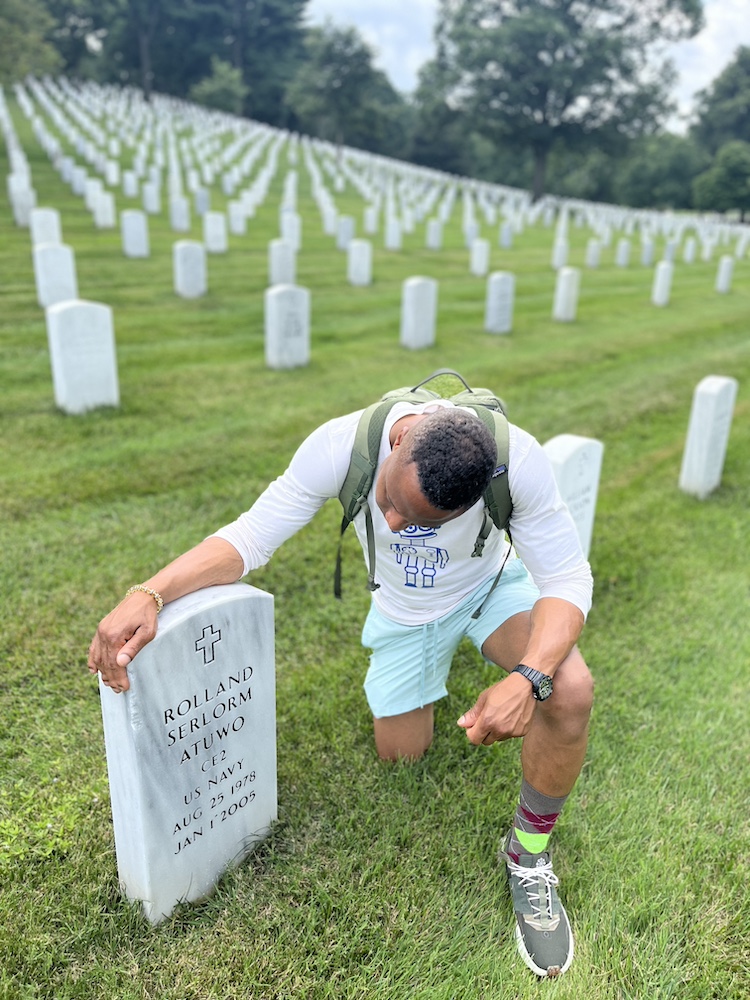
I currently live in Grand Rapids, Michigan, and there’s this huge art initiative in Grand Rapids called ArtPrize. There were just so many people in the city, a family member was killed in combat. And so it’s part of, Okay, how can I acknowledge this individual’s death but still embrace the fact that the city is lively with art and people are connecting and people are united? The freedoms that we’ve sacrificed for are so that we can enjoy the freedoms of art—while still mourning. I sent an email to some individuals and said, “I’d love to figure out a way to acknowledge veterans who give us the freedom to create and be artistic.” And so I met over coffee with this gentleman called Tyler Way.
Making a Difference for Veterans with Art
He and I collaborated and we created the initiative Has Heart. And so I would share my ideas with Tyler and he would turn them into beautiful pieces that we would sell and give proceeds to veteran organizations.
But at this one event, we came across a marine who was injured by a sniper’s bullet in Iraq. The bullet left him a quadriplegic and he was unable to speak, but he had a caretaker with him at our table. And so I approached him and I said, “This is a t-shirt we’re creating for veterans.” And then his caretaker said, “You know, one of his dreams before he was injured was to create a design himself, he was a big t-shirt collector, and t-shirts spoke his language.” And so I asked him if he would be interested in creating a design. And so that’s when we pivoted from creating designs ourselves to connecting veterans who have been injured with creative designers, so that they can create artwork.
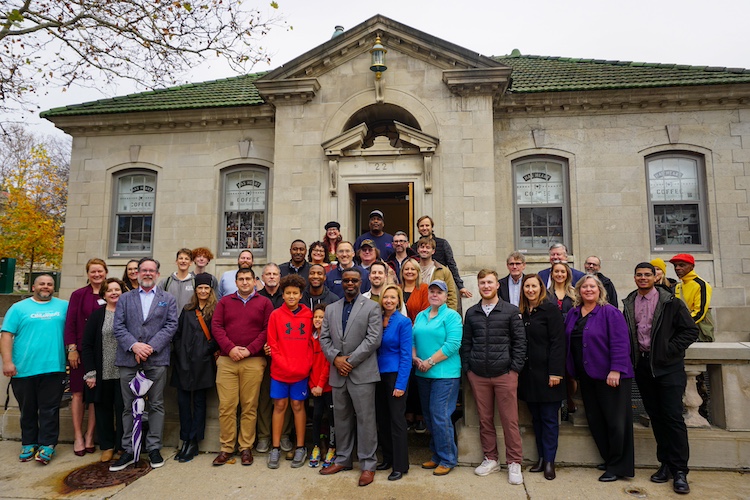
We are now empowering veterans to be creative, to tell their stories, to hopefully heal, to connect them to their communities by pairing them with creative designers from successful design firms, or just freelancers looking to give back to veterans.
And Has Heart is purposely doing that, hoping veterans can heal, express themselves, and share their stories with community members that can get to know them and then eventually figure out ways to support the community. So we’re using art as a bridge for the veterans to express themselves and to connect and be a part of the community that they live in.
“We’re using art as a bridge for the veterans to express themselves and to connect and be a part of the community that they live in.” – Michael Hyacinthe
Inspiring Kids to Be Storytellers
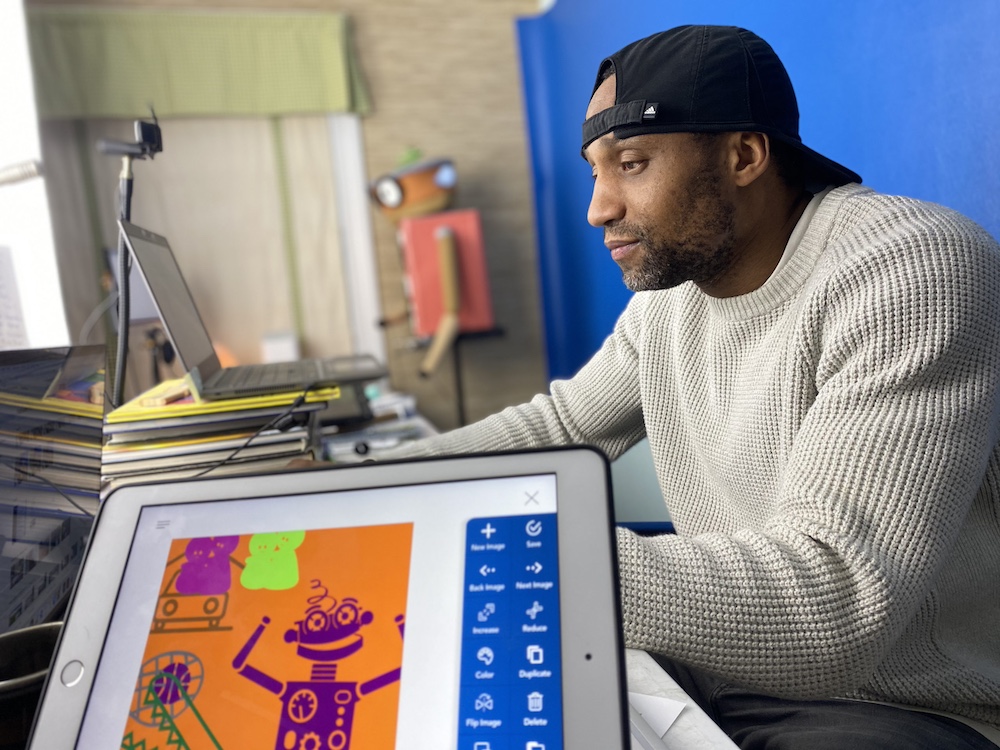
We said, “What if we can create a technology that would allow a veteran to create independently?” And so, we set off to create this app called Wimage, and Wimage is an app that converts words to images.
And so it was the work of Has Heart that inspired us to create Wimage—words to images—as a technology company that is inspiring kids to become storytellers, designers, and animators.
So we launched the app and we tested the app with two demographics: the veteran population and the early childhood population. And so we got positive feedback from the early childhood population. Parents said to us, “This is a really cool tool. We can help kids tell visual stories. We can help kids learn vocabulary. We can help kids become storytellers.”
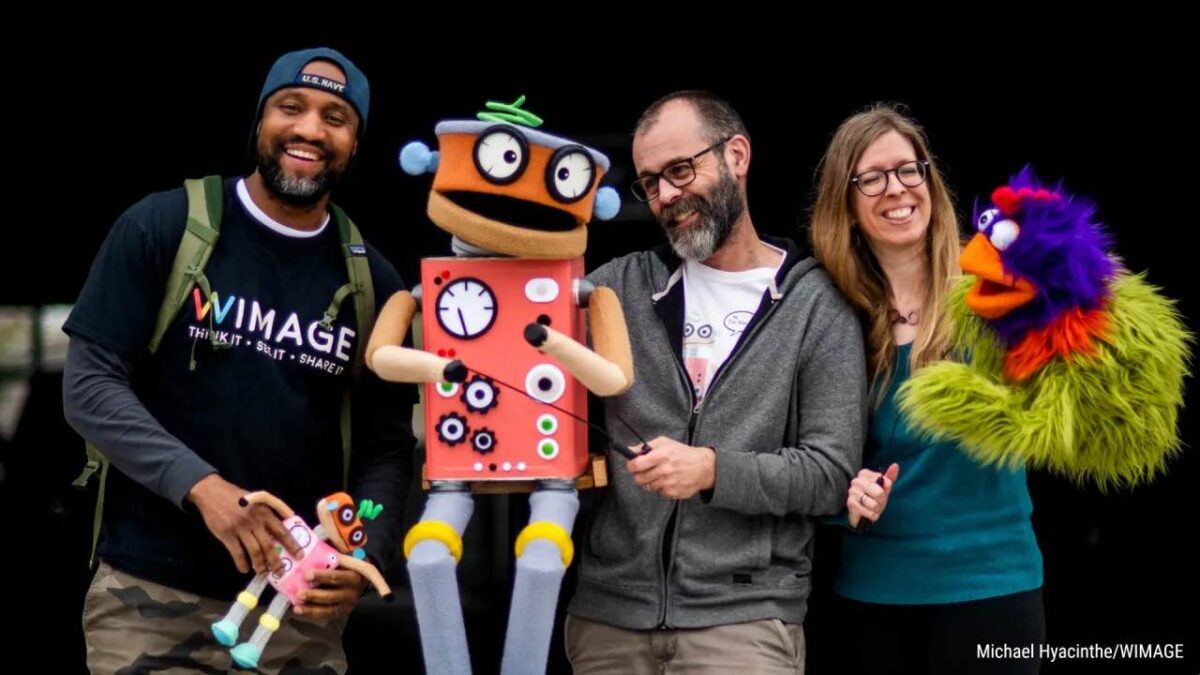
So we pivoted from using the tool for veterans to using a tool that would inspire kids to be creatives and storytellers. We created Wimee the Robot that is now the face of the app that has blossomed into a PBS show called Wimee’s Words. And it starts with allowing them to recognize the value of their imaginations. And so that’s what Wimage is all about, putting a tool in a child’s hand so that they can see their ideas and create the stories that they want to share with the world.
I think, when you do good, good things turn out, and I’m happy that the work that we created with Has Heart is what inspired this really remarkable children’s media and technology company.
Pray and Never Give Up
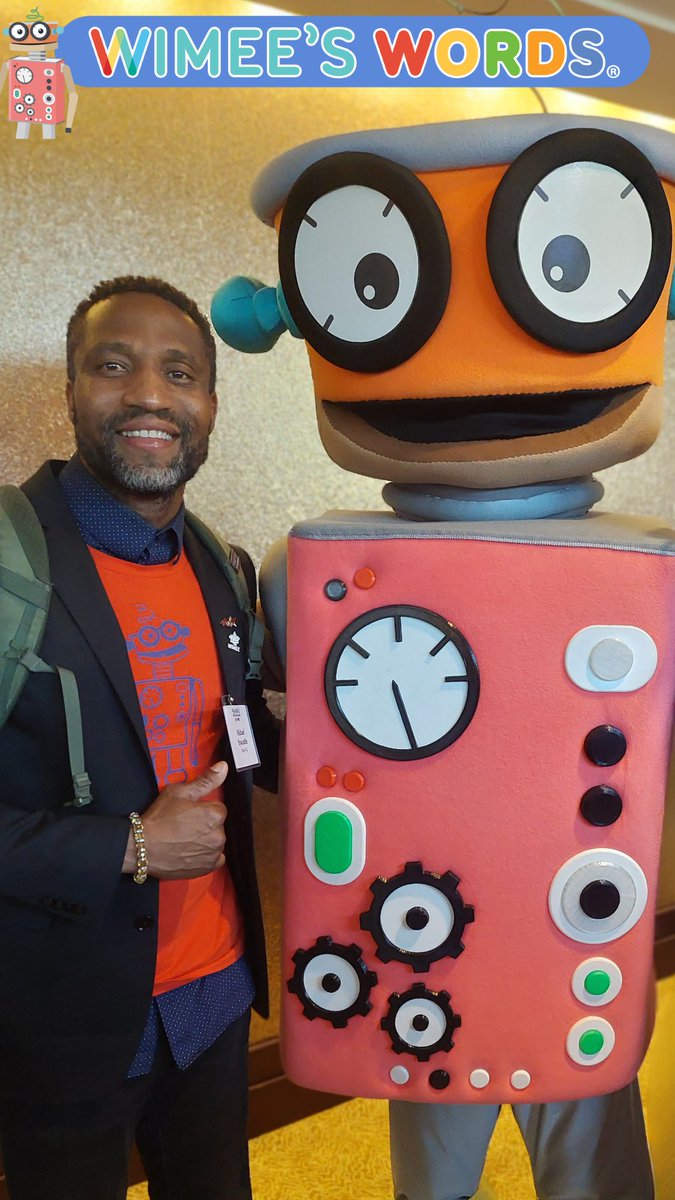
I think the military developed me into the person that I am today. I was determined never to fail and never to give up. It really made me who I am.
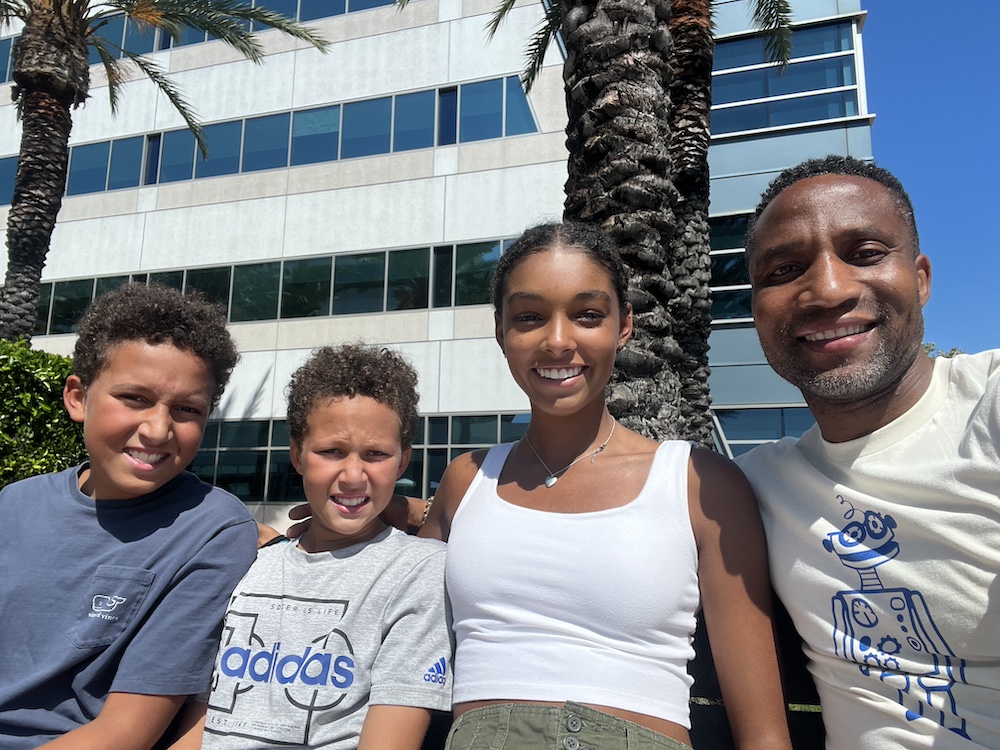
Prayer’s always been a big part of my life because this journey has not been easy, from my military service to the journey that I’ve lived as a father to my children and as an entrepreneur. There are a lot of ups and downs in this journey of life, which sometimes are completely out of our control, but knowing that ultimately I’m doing God’s will and I need His strength, I know that I am not alone, that I have someone—the Creator—that is with me and that is guiding me through good and bad. I think we all need to know that we are not alone in this journey and acknowledging that through Him, we can get through things—that requires faith and it requires God’s grace, and I can only find that through prayer.
“There are a lot of ups and downs in this journey of life, which sometimes are completely out of our control, but knowing that ultimately I’m doing God’s will and I need His strength, I know that I am not alone, that I have someone—the Creator—that is with me and that is guiding me through good and bad.” – Michael Hyacinthe
So this is Jesus Listens, January 1st:
Lord, I receive today as a precious gift from You. I realize that the present moment is where You meet with me. This is the day that You have made. I know You have carefully prepared it for me—with tender attention to every detail. So I have good reason to rejoice and be glad in this day!
As I journey along the path of Life, I’ll search for signs of Your loving Presence. I delight in finding the little blessings You sprinkle alongside my pathway—sometimes in surprising places. As I discover them, I’ll thank You for each one. This keeps me close to You and helps me find Joy in my journey.
In Your blessed Name, Jesus,
Amen
Narrator: Be sure to catch Wimee the Robot on the PBS show Wimee’s Words, and check out the new book, Wimee Learns About Money. To find out more about the Has Heart organization, please visit www.hasheart.us.
Stay tuned to Katharine Hayhoe’s story after a brief message.
Give the Gift Of The Bible
It goes without saying, but the Bible has changed so many lives. Take a second to think about if you didn’t have access to a Bible or the freedom to own one. This is a reality that many are facing. That’s why I want to tell you about one of our partners, Cru [Campus Crusade for Christ]. Cru has missionaries in almost every country, and they’re seeing people come to know Jesus.
There’s just one thing they’re missing: a Bible in their own language. One missionary said, “I’ve never seen such a thirst for the Word of God in my country.”
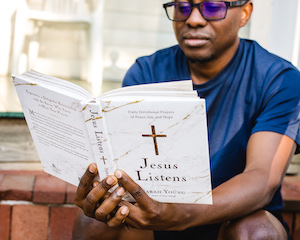
For only $24 a month, you can provide three people with Bibles each and every month. When you sign up to provide three Bibles with a monthly gift of $24, as a thank you, Cru will provide meals to 12 hungry individuals through their humanitarian aid ministry. Plus, you’ll receive a free copy of our Jesus Listens devotional. Simply text “Calling” to 71326 to help today.
Imagine just how much this gift could change someone’s life. So text “Calling” to 71326 to help now or visit www.give.cru.org. Messaging and data rates may apply. Available to U.S. Addresses only.

Experience the hope of the resurrection with Jesus Calling for Easter. This book offers 50 seasonally-themed devotions from Sarah Young’s New York Times bestseller Jesus Calling. Inside, you’ll find resurrection truths, hope for the new season, joyous reasons to celebrate, and full Scripture verses.
Get your copy to create a daily reflection of hope throughout the Easter season. Jesus Calling for Easter also makes a wonderful gift to be cherished for years to come.
Our next guest is Katharine Hayhoe, a climate scientist who’s on a mission to spread hope, knowledge, and awareness on how climate change affects us all and how we can make a difference today for a better tomorrow.
Katharine Hayhoe: My name is Katharine Hayhoe and I am a climate scientist. What that means is I study how humans are affecting our planet and then how those changes are impacting us.
Studying God’s Universe
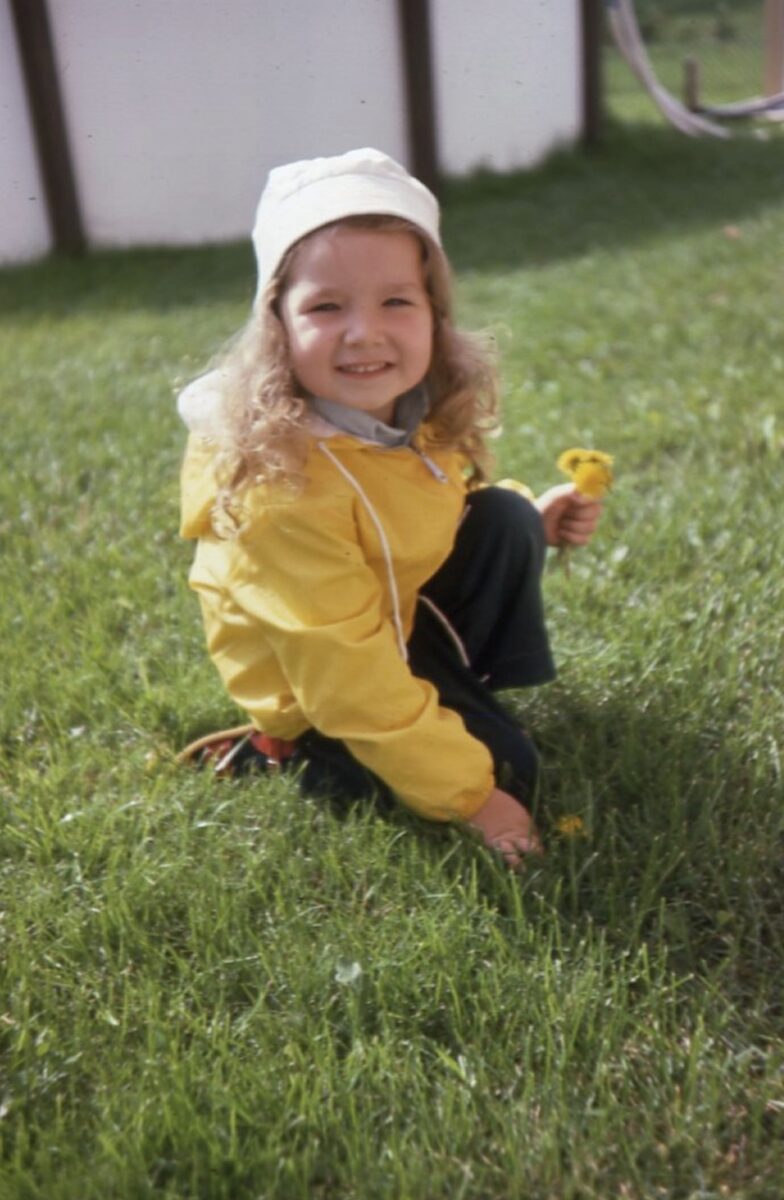
I always loved science growing up. My dad was not only a teacher in our local church, but he was also a science teacher. So I grew up with the perspective of, What is science other than trying to figure out how God created and set up this incredible universe that we live in?
My undergraduate degree is in physics and astronomy. I was planning to be an astrophysicist. I was almost all the way through my undergraduate degree and looking towards graduate school, when I needed an extra class to finish my degree. And there was this brand new class on climate change and I thought, Well, that looks interesting. Why not take it?
And that was where I was completely shocked to find out that, yes, climate change is an environmental issue, but it’s also a food issue and a hunger issue, it’s a poverty issue, and a health issue. It, at its core, is a human issue. It affects us all, but it doesn’t affect us all equally. It disproportionately affects the poorest and most vulnerable people who’ve done the least to cause the problem. Not only that, but it’s not not a future issue anymore. It’s already here and now affecting all of our lives.
That was what made me realize I need to do everything I can to help fix this problem, because otherwise, how can I truly feel that I am expressing God’s love and using the gifts that God has given me to love and to care for others? You don’t often think of physics as being a way to love others, but this was a way that I could use my skills to do this.
“I need to do everything I can to help fix this problem, because otherwise, how can I truly feel that I am expressing God’s love and using the gifts that God has given me to love and to care for others? You don’t often think of physics as being a way to love others, but this was a way that I could use my skills to do this.” – Katharine Hayhoe
What Is Climate Change?
We’ve known since the 1800s that digging up and burning coal, and a lot of oil and gas, produces heat trapping gases that are building up in the atmosphere, wrapping a blanket of carbon pollution around our planet. And just as if someone put an extra blanket on you, you’d wake up sweating. In the same way, our planet is running a fever because of this extra blanket that we’ve wrapped around it.
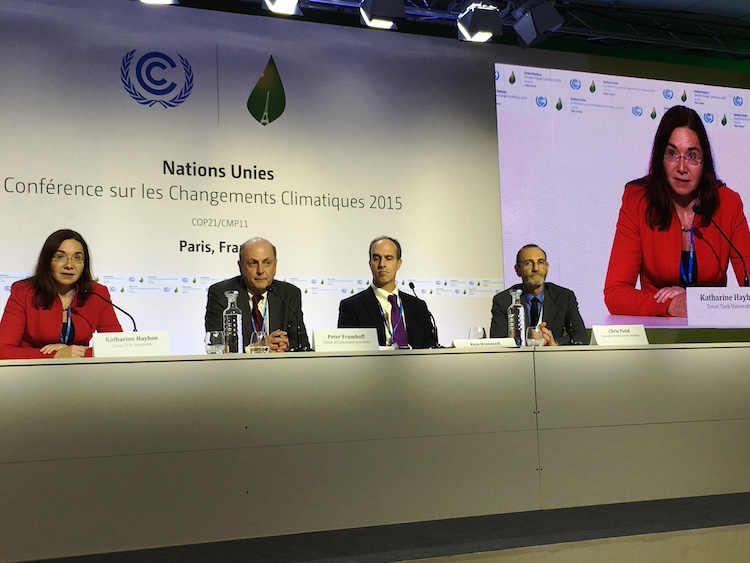
We scientists are the ones who look at natural cycles and volcanoes and reasons why climate has changed in the past. And when we do, we know that every natural suspect today has an alibi. According to natural factors, we should be very gradually cooling right now, not getting warmer, faster and faster.
What you and I experience is not a change in the average temperature of the planet. What we experience is how climate change is loading the weather dice against us. It’s taking naturally occurring events that we’ve always had, like heat waves, droughts, floods, wildfires, and it’s super-sizing them, making them more frequent, more intense, more dangerous. This is affecting all of us, but it doesn’t affect us all equally.
I spent a number of years growing up in Colombia as a missionary kid. And in Columbia, people take their coffee very seriously, and the coffee only grows at certain altitudes in certain temperature bands. So what we’re seeing as climate changes is where you can grow coffee is shifting. So the farmer that used to have the fields that grew the really good coffee, all of a sudden harvests are becoming really unpredictable.
And I saw there firsthand how when floods come, there are people who’ve built their home out of cardboard boxes and sticks on the side of a mountain, and when the floods come, their home is entirely washed away. They don’t have insurance to rebuild. They have no way to provide a shelter for their family. Similarly, when crops fail, farmers who literally depend on those crops to feed their family, they have no way to do so. When we see hurricanes hit, it’s the people who can’t get out of the way, who are sick, or who don’t have the ability to transport themselves out of the city, or can’t pay for a different place to stay—those are the people who are most in harm’s way.
Bridging the Faith/Science Gap
Even though I became a climate scientist, because I was a Christian, for a long time I didn’t tell anyone about that because it just isn’t something that you combine. And in fact, it turns out that a lot of us scientists are this way. More than 70% of scientists at research universities in the U.S. identify as spiritual people, but surveys have shown that most of us don’t engage in our local churches just because we feel like we wouldn’t be accepted if we talked about our science. Which is really heartbreaking, isn’t it? Especially if we believe that science is just figuring out what God was thinking when He created this universe.
“More than 70% of scientists at research universities in the U.S. identify as spiritual people, but surveys have shown that most of us don’t engage in our local churches just because we feel like we wouldn’t be accepted if we talked about our science.” – Katharine Hayhoe
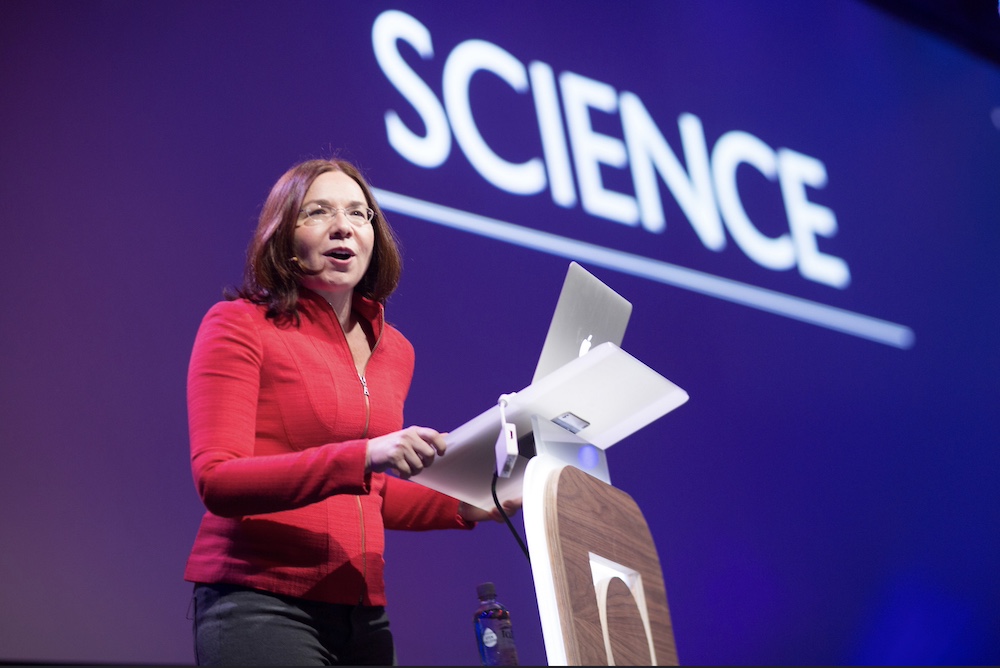
We moved to Lubbock, Texas, and I started to get invitations to come speak to a women’s group, a book club, the Senior Citizens Home, because people were curious. They’d heard a lot of argument and debate over climate change, and they figured, Well, we’ve got a climate scientist in town, let’s ask her. So pretty soon I realized that I could address most of the sciencey-sounding questions that people had, but then people started to ask me, “Obviously you care because you’re a scientist, but why should I care?” So when I started to realize this, the next invitation came in and I thought to myself, Well, if I’m not going to tell people now, when am I ever going to do it? So I was nervous. I prepared a totally different presentation where I brought in Bible verses about Creation and loving others, and I talked a lot more about how climate change affects people even in our own cities, let alone on the other side of the world. And I didn’t know what to expect, but what happened was completely different than any other groups I had ever spoken to. I could see the arms uncrossing. I could see people leaning forward. I could see heads nodding. I could see that we were connecting heart to heart rather than head to head. And that made me recognize the power of having these conversations where we begin with what we have in common, rather than what divides us. With what we both agree on, rather than what we argue over. And then from there, talking about what we could do together to truly make a difference.
Ways We Can Take Care of Our Earth
Often, when we think about taking action on climate change, we think about changing our light bulbs and maybe driving a plug-in car and eating less meat and more plants, or reducing our food waste, taking public transportation, and all of those are very good things to do. And all of those do actively reduce the amount of carbon pollution that our personal activities produce.
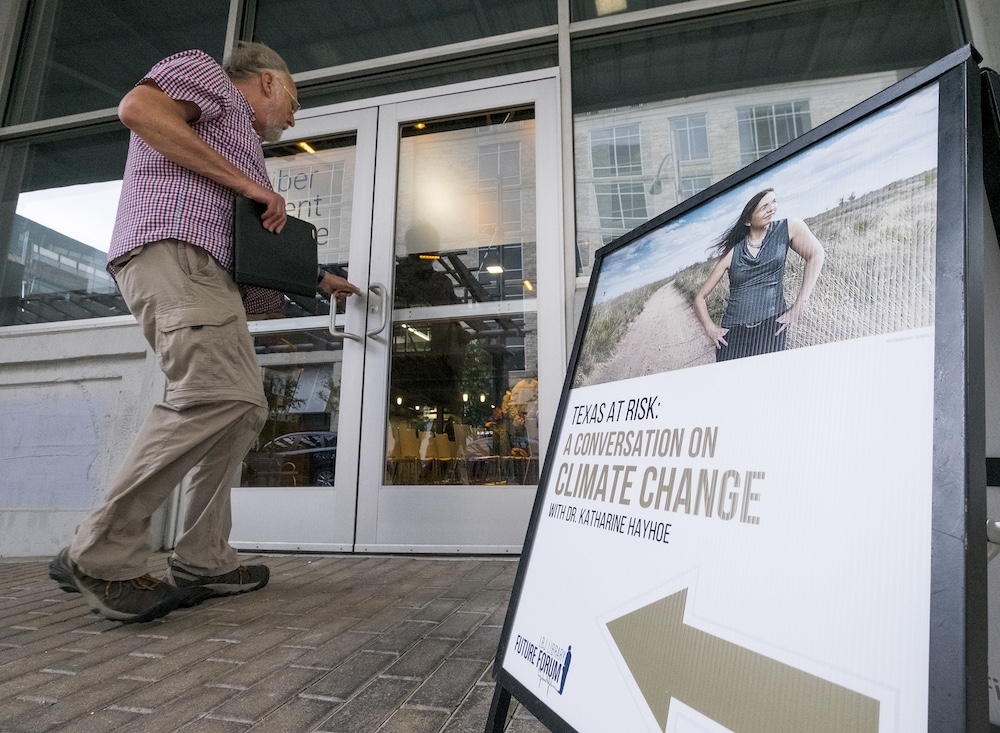
Often these days, people say to me, “What’s the number one thing I can do?” And my answer these days is do something, anything, but then talk about it, because surveys show that in the United States and in most countries around the world, we are not having conversations about this issue. Now, talking is not enough, but talking is how humans begin to work together to fix any problem. And so just initiating that conversation from the heart rather than the head, talking about what we have in common rather than what divides us, and connecting it to our hands—what we can do to make a difference—that is the first, most important step that I believe every one of us can take.
“Just initiating conversation from the heart rather than the head, talking about what we have in common rather than what divides us, and connecting it to our hands—what we can do to make a difference.” – Katharine Hayhoe
Conversation With God About Anything and Everything
Prayer was a big part of my journey, and I don’t view prayer as a formal activity that you engage in at a certain time of the day. I just view prayer as having a conversation with my Abba, with my Daddy. And so just sort of having that conversation naturally throughout the day when you’re struggling, when you don’t know what to do, or when you’re actually feeling joyful or excited or happy about something—prayer, I think it can be as natural to us as breathing.
There’s beautiful prayers in Jesus Calling and Jesus Listens and all the other amazing books Sarah Young‘s done, but don’t ever feel afraid to just use your own words. It’s just about having that conversation and expressing how you feel, whether it might be joyful, whether it might be sad, whether it might be stymied, not knowing where to go. Whenever I feel that way—and we often do in life,—prayer is really sort of an essential part of just trying to figure out, How do I feel about something? What is the next step I should take in a certain direction? Or when I’m feeling discouraged, just sharing openly how I feel with someone who I know will always understand.
“It’s just about having that conversation and expressing how you feel, whether it might be joyful, whether it might be sad, whether it might be stymied, not knowing where to go.” – Katharine Hayhoe
I’m going to be reading from Jesus Listens, January 18th:
My great God,
The world is in such a desperately fallen condition that Your promise to make everything new is my only hope. Help me not to get discouraged when my efforts to improve matters are unsuc- cessful. I must keep in mind that all my efforts are tainted by the brokenness around me and within me. I won’t stop trying to do my best—in dependence on You—but I know that this world needs much more than a tune-up or repairs. It needs to be made completely new! And this is absolutely guaranteed to happen at the end of time, for Your words are trustworthy and true.
I have good reason to rejoice because You have promised to renew all things—including me—making everything gloriously perfect!
In Your triumphant Name, Jesus,
Amen
Narrator: To learn more about Katharine Hayhoe, check out her book, Saving Us: A Climate Scientist’s Case for Hope and Healing in a Divided World wherever books are sold.
If you’d like to hear more stories about unleashing our special gifts to change the world, check out our interview with Elisabeth Hasselbeck.
Next week: Joseph Rojas
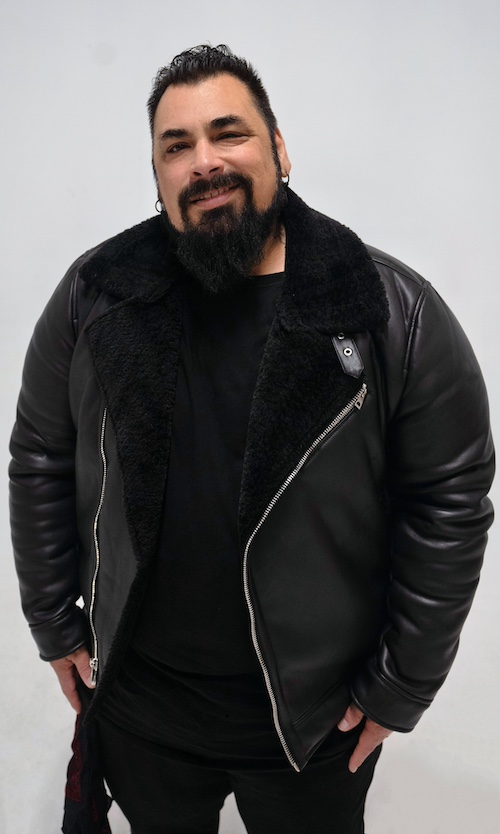
Next time on the Jesus Calling Podcast, we’ll hear from Joseph Rojas, part of the Christian rock group Seventh Day Slumber. Joseph vulnerably shares about his abusive childhood, his battle against drug addiction, and how the first thing that came to him when he was in the throes of a terrifying overdose were the simple prayers his mother had prayed.
Joseph Rojas: I just know that in the back of the ambulance, I just know that my heart was calling Jesus. My heart was crying out to Jesus, and I know for a fact that He was with me.

